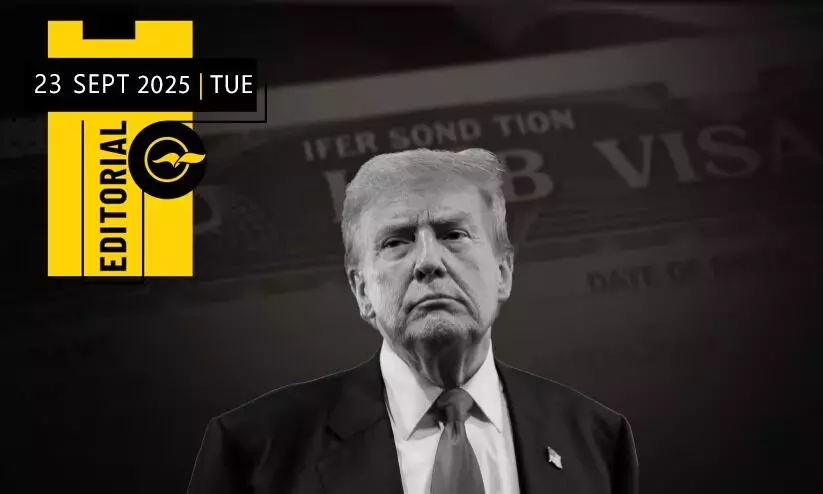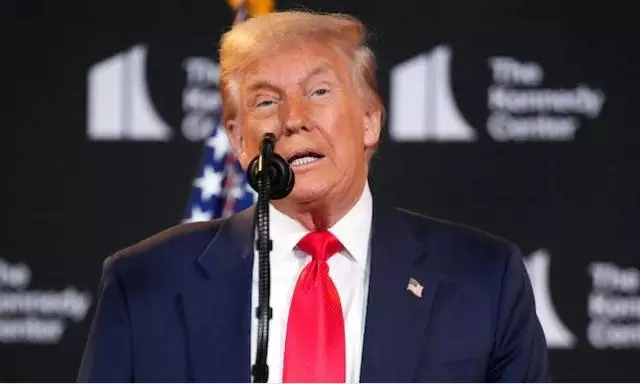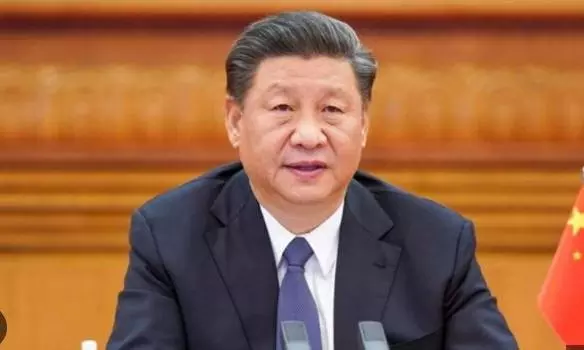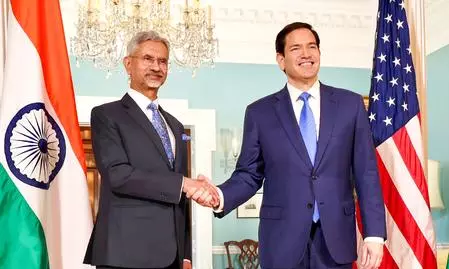
Trump’s blow
text_fieldsIt has become clear within the very first hours of his swearing-in that Donald Trump, in his second term as U.S. President, was turning America’s wheels of governance with an even more aggressive mindset. Over the past six months, the world has witnessed numerous instances of how his populist slogan, “Make America Great Again” (MAGA) has been implemented through policies rooted in anti-immigration and racial biases. Most importantly, it was the continuation of the tariff policies stemming from the trade war he initiated in his first term. In the first week of April, even countries friendly with the U.S., including India, were slapped heavy tariffs on imports. Trump initially imposed a 26 percent tariff on India, which he later doubled as a penalty for the Modi government’s friendly ties with Russia in the form of import of Russian oil. As a result, Indian products now face 50 percent higher tariffs than before when being exported to the United States. Following this policy, which severely impacted India’s export sector, the Trump administration launched another major blow on the country. The annual application fee for the H-1B visa, required for professionals seeking employment in the U.S., has been raised to one lakh dollars. The Modi government is left reeling as America’s visa policies directly affect hundreds of thousands of Indian expatriates working in the IT sector and beyond, along with their families.
Professionals working in the science, technology, engineering, and education (STEM) fields are generally the ones who go on H-1B visas. Until now, the visa fee ranged from an average of ₹2.5 lakh to ₹5 lakh, but it has now been suddenly set at one lakh dollars (approximately ₹88 lakh). On average, about 85,000 H-1B visas are issued by the United States each year. Looking at data since 2015, the largest number of professionals coming to the U.S. on this visa are from India. As of last year, it is estimated that over four lakh Indians went to the U.S. on H-1B visas. With this hike in visa fees, two outcomes are certain: first, companies will be unwilling to renew visas for a large percentage of existing workers if it applies to them; second, new recruitments will not take place at this rate. Either way, Indians in the STEM sector will face significant job losses. Alongside this, there will be restrictions on Indian students seeking higher education in the United States. The extent of the fallout from all this is impossible to predict. As observed by the Ministry of External Affairs, our country is facing a major human catastrophe through this single move. It is clear what drives such a harsh decision: it is fundamentally nothing other than Trump’s racially based, anti-immigration policy. Trump announced his stance against H-1B visas even during his first term. According to him, the H-1B visa is an easy route to import foreign workers at lower costs while denying opportunities to the country’s own citizens. He claims that many U.S. citizens have lost jobs because of the H-1B visa, and this measure is aimed at correcting that. Additionally, with the increase in visa fees, it is estimated that only highly skilled professionals will now apply for jobs from abroad. Even employment experts in the United States do not accept this justification. The policy is generally assessed as a move that creates uncertainty in the country’s job market. The impact of this is certain to reflect significantly on our country as well.
It cannot be overlooked that this blow to the country has come from Prime Minister Narendra Modi’s close friend himself. India figures prominently among the nations most affected by Trump’s tariff policy. India has been unable to confront it strategically. While that impact continues, another strike has arrived in the form of the H-1B visa rule. Some announcements made by Modi two years ago on this specific issue are worth recalling at this moment. In 2023, during his visit to the U.S., he addressed expatriate Indians at the Regal Building in Washington. It was there that he announced that Indians in the U.S. would no longer have to leave the country to renew their H-1B visas. In the backdrop of the Lok Sabha elections, that became big headlines. After Modi’s getting a third term and his friend’s return to the U.S. presidency for a second time, it was assumed that this announcement would indeed translate into reality. But the friend betrayed him: by increasing the H-1B visa fee to the point of making it practically inaccessible, Trump has ended Indians’ American dreams. Modi’s response to this is even stranger. His statement that India’s main enemy is its dependence on foreign nations amounts to an admission that his diplomacy has failed. Modi’s own creation, NITI Aayog, shares a similar view: those returning to India after losing jobs in the U.S. will supposedly become the seed capital for Modi’s “Developed Bharat” mission. Is there any clearer proof needed of our leadership’s incompetence? What else can one do other than be ashamed!















